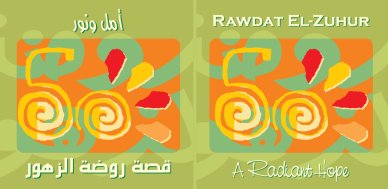September 2010
Newsletter
January 2010
News
September 2009
Newsletter
December 2009
Newsletter
December 2007
Newsletter
December 2006
Newsletter
December 2005
Newsletter
2004 - In
November 2004 Rawdat El-Zuhur 50th anniversary book was published
by Turbo-Design-Ramallah, Palestine. A Radiant Hope (Amal wa Nour),
a beautiful book, is 60 pages in Arabic and English. It is full of
pictures, text and stories of the school and its founder, Elizabeth Nasir.
Friends who have not received it and would like a copy, please contact
info@rawdat.org
You can also download it from this site
The format is in PDF, and the first complete
link will take about 40 minutes to download if you use a modem with a fast
computer.
Whole Book, A Radiant Hope. It is broken
down into 5 page segments that can be viewed five pages at a time
The format is in PDF, and the first complete link
will take about 40 minutes to download if you use a modem with a fast computer.
Whole Book, A
Radiant Hope. Read it 5 pages at a time. They are broken down
into 5 page segments that can be viewed five pages at a time.
Pages 1-5
Pages 6-10
Pages 11-15
Pages 16-20
Pages 21-25
Pages 26-30
Pages 31-35
Pages 36-40
Pages 41-45
Pages 46-50
Pages 51-55
Pages 56-60
Archived Newsletter
that have been entered. Please click the pin below
November
2003
July
2002
November
2002
November
2001
November
2000
November
1999
November
1998
Other
News
This week in Palestine – issue No. 48, April 2002
Elizabeth Nasir- ( 1909-1987)
The dynamic woman behind the story of Rawdat El-Zuhur.
Fifty years ago on a
cold February day in 1952, Elizabeth Nasir who was the first woman
director of the social welfare department in Jerusalem (Jordan at that
time), was on one of her inspection tours in the area.
She ran across two little girls around six and five years old hanging around
one of the streets of Ramallah. Their sight meant a social
problem to Lizzy as she was known by her friends. Immediately
she got out of the car and spoke to the girls to find out that they were
begging because they had no food at home. Upon accompanying those girls
to their home, which was a bare hovel with torn sack cloth on the floor,
she found out a blind mother, and a sick father with no food whatsoever
aound. She immediately got a court order to put the girls in the
reformatory to spare them further destitution and humiliation.
This incident was the
turning point in the life of Elizabeth Nasir, who had been evicted
from her home in Jaffa in 1948 where she was working as a social worker.
She committed herself to shelter destitute girls and help them
earn a living by honorable means. To fulfill that goal, she used
part of her home for this project, and she was personally on the
streets looking for destitute girls, and searching for them in hovels and
caves. She even sat in coffee shops in the old city, to the
shock of passers by, so that she can talk to drivers and laborers
who knew the whereabouts of those girls. With financial
support of her many friends, Elizabeth was able to train the girls
with the necessary skills for work. She believed very
strongly in the power of music in lifting the spirits, and
she was the talk of the town as she danced and skipped with those barefooted
girls. In 1955 she was awarded a special certificate
from the National Recreation Association of the USA for “Enriching the
Human Spirit through Recreation.” She intentionally named the home
of those girls Rawdat El-Zuhur, (Garden of flowers) to spare them
any stigma and to make them feel like flowers in a garden.
She was avante-garde for her generation, and she always had original ideas
and her friends and colleagues never ceased to be amazed at her energy
and her progressive thinking, and her determination to achieve what
she set out to achieve. She gets credit for playing a very important role
in putting an end to the begging phenomenon in Jerusalem before 1967.
Elizabeth had
started her career as a teacher, and then she shifted to social work.
But she was truly a mixture of both, a born teacher and a dedicated
social worker which were a great asset to the spirit of Rawdat
El-Zuhur. The loving care, compassion and the respect for the
human dignity continue to prevail up till this day. She never allowed
anybody to sulk or be violent with the girls. Only a pleasant teacher
could work at Rawdat El-Zuhur, and the only time she was forced to
ask a teacher to leave was when that teacher referred to the girls
as “street girls”.
After the Israeli occupation
in 1967, the new challenge for Lizzy was to meet the arising
need for Palestinian schools in East Jerusalem. By 1971 Rawdat
El-Zuhur developed into a coeducational elementary school, with an
emphasis on moral values and quality education. A kindergarten was added
in 1979. Music and dancing, along with art, and sports continue
to be an integral part of the school curriculum. The dream
of Elizabeth Nasir was fulfilled before she passed away on April 2, 1987.
Elizabeth and her twin
sister Victoria were born in Nablus in 1909 to Rev. Hanna
Nasir, the Anglican pastor in Nablus at the time, and his wife Sa’ada
Shatarah. She studied at St. Mary’s School in Jerusalem and
was amongst the first Palestinian women university graduates, as she got
her B.A. from the American University of Beirut in 1933. She
was probably one of her kind as head of an organization who had resigned
in her life time, against the norm in the Arab world of
holding on to a seat “until death do us part”. But then Lizzy was
a confirmed non conformist, so she was able to enjoy being honored
in her life time by the board, staff, and children of Rawdat El-Zuhur
and her friends in July 1986. The Elizabeth Nasir Trust Fund was
established from donations in her honor on that occasion, and donations
in lieu of flowers for her funeral were added to that fund as well.
Celebrations for the 50th anniversary of Rawdat El-Zuhur will take place
on the 4 th and 5th of April 2002, and a special musical will be put up
in honor of the memory of Elizabeth Nasir.






